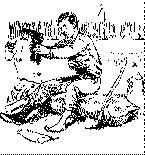

|
|
In this position, we were in plain view of the enemy's works, and in such close proximity, that we were exposed to his fire night and day, and the enemy to ours. There was scarcely a moment in which "we could not hear the incessant 'pop,' 'pop', of musketry from the rifle-pits, which dotted the hillsides and woody valleys, or from behind the trees, fences, or any species of cover which the combatants could secure." We finally agreed with the Confederates who confronted us, to form a temporary suspension of hostilities---neither army was to fire except in case of an advance---and as a result, a good many deserters came into our lines. In the immediate front of our Regiment was a ravine in which was water surrounded by a clump of trees and bushes. It was neutral ground between the two hostile lines. Both Union and Confederate soldiers secured water from that ravine, and in going to it and returning from it, they were in plain view of both armies. They would frequently meet there and fraternize. When we found out that some of the Confederates, whom we met at the ravine, would desert if they had a chance, we thereafter, on going for water, put on an extra pair of blue pantaloons and blouses, which we put off in the bushes at the ravine, and there the Confederates pulled them on over their gray uniforms, and with our canteens slung across their shoulders, emerged from the bushes with us, and thus came into our lines. Frequently there were a half dozen of us at a time sitting in our tents without pantaloons and blouses, which, on going for water, our comrades had borrowed for the purpose named. There were more than a hundred deserters brought into our lines in three or four days through this "Yankee trick" by the Regiment of our Brigade, before it was discovered by the Confederate officers. The troops of the enemy in our front, who practiced the deception with us, on being detected, were relieved, and others, not so tired of the war, were put in their places. |
|
The first object for which soldiers search, when they are given permission, is something to eat; especially so, when they have been dieting for a fortnight on rice and sweet potatoes. We soon discovered that the oyster beds below the city for some reason had not been disturbed for a long time. We went down there with teams and returned loaded with several hundred bushels of the delicious bivalves, from which we ate our Christmas dinners. |

|
Post-al note: During World War II, those in the armed services had
their letters home sent at no cost by writing "free" in place of a
stamp. The Union soldiers in the Civil War were not as fortunate. They
had to stamp their letters, but if they had no stamps they could write
"Free" on them and mail them, but in order for the recipients to get
them, they had to pay the postage due! |
JOSEPHINE MILLER
Gen. H. W. Slocum, in the North American Review, February 1891, narrates this interesting incident: |
|
|
||
| previous page |
|
next page |
|
|
||